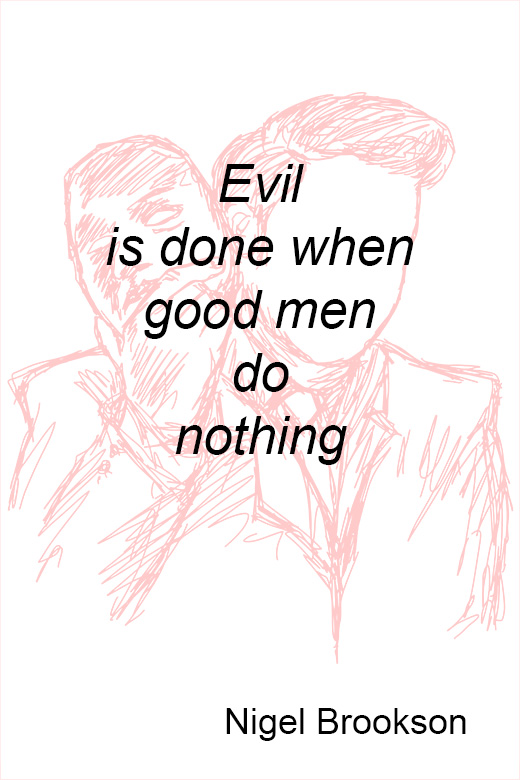This happens to be one of my favourite quotes, and while could have been placed in either the ‘Philosophy’ category, or ‘Theology’ category; you’ll see why further down, one version of this quote, perhaps now the most spoken, has been attributed to Edmund Burke, who served as a member of Parliament between 1766 and 1794 in the House of Commons of Great Britain by President John F. Kennedy who used the words while addressing the Canadian Parliament in 1961, so I placed this article within the ‘Political’ category for discussion.
At the conference table and in the minds of men, the free world’s cause is strengthened because it is just. But it is strengthened even more by the dedicated efforts of free men and free nations.
President John F. Kennedy
As the great parliamentarian Edmund Burke said, the only thing necessary for the triumph of evil is for good men to do nothing.
Conclusive attribution has been difficult, and there have been many versions of the sentiment behind the quote attributed to many people.
In 1770 Edmund Burke wrote about the need for good men to associate to oppose the cabals of bad men. The second sentence in the excerpt below is listed in multiple quotation references and shares some points of similarity.
No man, who is not inflamed by vain-glory into enthusiasm, can flatter himself that his single, unsupported, desultory, unsystematic endeavours are of power to defeat the subtle designs and united Cabals of ambitious citizens. When bad men combine, the good must associate; else they will fall, one by one, an unpitied sacrifice in a contemptible struggle.
In 1867 the British philosopher and political theorist John Stuart Mill delivered an inaugural address at the University of St. Andrews. The second sentence in the excerpt below expresses part of the idea of the quotation.
Let not anyone pacify his conscience by the delusion that he can do no harm if he takes no part and forms no opinion. Bad men need nothing more to compass their ends, than that good men should look on and do nothing. He is not a good man who, without a protest, allows wrong to be committed in his name, and with the means which he helps to supply, because he will not trouble himself to use his mind on the subject.
The earliest attribution of the modern saying to Edmund Burke was found by top researcher Barry Popik. In July of 1920 a man named Sir R. Murray Hyslop delivered an address at a Congregational church conference that included the following:
Burke once said: “The only thing necessary for the triumph of evil is that good men should do nothing.”
However the sentiment can be traced back to the wisdom of Solomon.
Written from the time of Solomon (970-931 BC) through to the book circulating in the reign of King Hezekiah (700 BC) it can be seen that the quote had biblical origins.
Proverbs 24:10-12 (New King James Version)
10 If you faint in the day of adversity,
Your strength is small.
11 Deliver those who are drawn toward death,
And hold back those stumbling to the slaughter.
12 If you say, “Surely we did not know this,”
Does not He who weighs the hearts consider it?
He who keeps your soul, does He not know it?
And will He not render to each man according to his deeds?
While looking across different translations, from different bibles, I came upon a version that uses a more modern interpretation:
Proverbs 24:10-12 (Christian Standard Bible)
10 If you do nothing in a difficult time,
your strength is limited.
11 Rescue those being taken off to death,
and save those stumbling toward slaughter.
12 If you say, “But we didn’t know about this,”
won’t he who weighs hearts consider it?
Won’t he who protects your life know?
Won’t he repay a person according to his work?
The scripture is certainly apropos, but positive attribution, to Solomon in this case, doesn’t end there either.
Whether or not Solomonic authorship is accepted by you, one can agree that the background of Proverbs seems to be the royal court at Jerusalem.
Although wisdom lit. in the ancient Near E antedates Proverbs by more than a thousand years, the particular form of instructions addressed to “my son” seems more like the Egyp. works The Instructions of Ptahhotep, The Instructions of Meri-ka-Re, The Instructions of Amen-en-het, and The Instructions of Ani.
The marriage of Solomon to Pharaoh’s daughter may have led to his interest in such instruction.
Traditionally, the bulk of Proverbs has been attributed to Solomon (cf. 1:1; 10:1; 25:1). The book itself mentions two other authors: Agur (30:1) and Lemuel (31:1).
There are two extreme positions:
(1) Solomon wrote the entire work, or
(2) he had no connection with it (except as the traditional “patron saint” of wisdom lit.).
A third viewpoint, more in keeping with the Biblical testimony, is that Solomon wrote most of the book, and the work of others was added to his.
Other than the modern-day version being used and attributed to politicians, the main reason I included this discussion under the ‘Political’ category is because the quote can be used for every person who complains about their lot in life and then blame politicians for it.
While politicians are most certainly to blame for what’s wrong with the world, in a democracy such as Australia, it’s the people who must speak up, not be the ‘Monday morning armchair critics’ who while watching the evening news, voice their displeasure at the TV.
Write to your local member, in a respectful manner, and encourage others to do the same. Remember, politicians want one thing more than anything else: to be elected, and re-elected. If thousands do something, instead of nothing, evil will not have a chance.
Evil is Done when Good Men do Nothing.
Nigel Brookson
